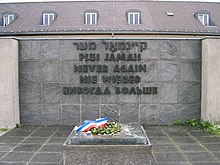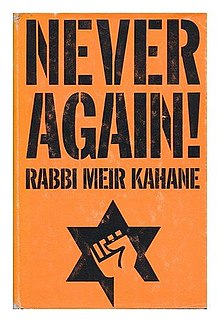Never again
The exact meaning of the phrase is debated, including whether it should be used as a particularistic command to avert a second Holocaust of Jews or whether it is a universalist injunction to prevent all forms of genocide.
It has also been appropriated as a political slogan for other causes, from commemoration of the 1976 Argentine coup, the promotion of gun control or abortion rights, and as an injunction to war on terror after the September 11 attacks.
[2][3] The poem is about the siege of Masada, in which a group of Jewish rebels (the Sicarii) held out against Roman armies and, according to legend, committed mass suicide rather than be captured.
Considered one of the most significant examples of early Yishuv literature, Masada achieved massive popularity among Zionists in the land of Israel and in the Jewish diaspora.
[7][8] Cultural studies scholars Diana I. Popescu and Tanja Schult write that there was initially a distinction between political prisoners, who invoked "never again" as part of their fight against fascism, and Jewish survivors, whose imperative was to "never forget" their murdered relatives and destroyed communities.
[9][10] Eric Sundquist notes that "the founding of Israel was predicated on the injunction to remember a history of destruction—the destruction of two Temples, exile and pogroms, and the Holocaust—and to ensure that such events will never happen again".
"[12] Kellner suggests that it is related to the "biblical imperative of memory" (zakhor), in Deuteronomy 5:15, "And remember that thou wast a servant in the land of Egypt, and that the Lord thy God brought thee out thence through a mighty hand and by a stretched out arm."
[14] Writing about the phrase, Ellen Posman observed: "A past though often recent humiliation, and an emphasis on former victimhood, can lead to a communal desire for a show of strength that can easily turn violent.
[11][3][16] The Jewish Defense League song included the passage "To our slaughtered brethren and lonely widows: / Never again will our people's blood be shed by water, / Never again will such things be heard in Judea."
The United States Holocaust Memorial Museum made the phrase, in its universal sense, the theme of its 2013 Days of Remembrance, urging people to look out for the "warning signs" of genocide.
[22][23][24][25] On 1 March 2022, after the Babi Yar Holocaust Memorial Center was hit by Russian missiles and shells during the battle of Kyiv, Ukraine's President Volodymyr Zelenskyy argued that "never again" means not being silent about Russia's aggression, lest history repeat itself.
[26] Multiple United States presidents, including Jimmy Carter in 1979, Ronald Reagan in 1984, George H. W. Bush in 1991, Bill Clinton in 1993, and Barack Obama in 2011, have promised that the Holocaust would not happen again, and that action would be forthcoming to stop genocide.
[31] In an article about the surge in antisemitic opinions and incidents since the October 7 attacks, the Wall Street Journal ran the caption "‘Never Again’ is a phrase used in reference to the Holocaust and other instances of persecution of Jews.
"[32] The rationale of "never again" also fueled the formation of truth commissions in Latin America in the aftermath of military coups, dictatorship, and political violence, in the intent that memory would prevent a reoccurrence.









